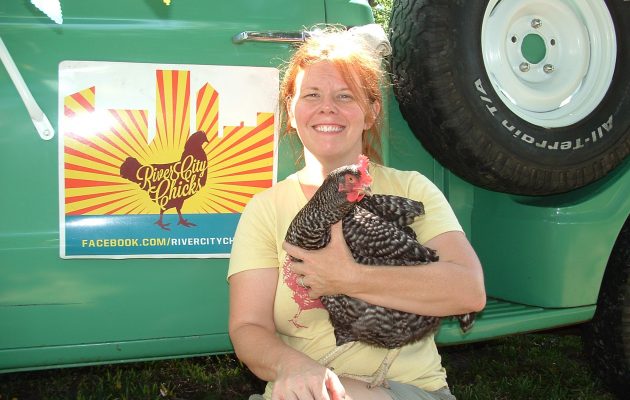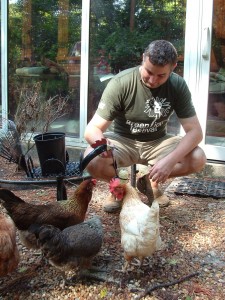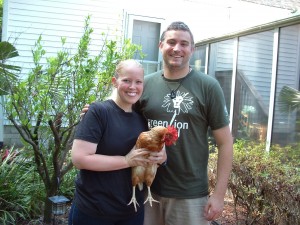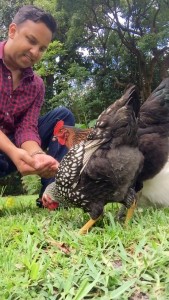Residents spearheaded fight for hen bill
Posted on July 5, 2015 By Editor Articles, Neighborhood News, Riverside, Avondale, Ortega, Murray Hill, Top Stories

The new legislation recently passed by the Jacksonville City Council to expand what has become known as the “chicken ordinance” has deep roots in the Riverside and San Marco neighborhoods. Several residents of the area were not only some of the first permit holders to have backyard chickens, but were also catalysts behind the movement for the City to allow backyard hens on residentially zoned properties in Jacksonville.
 “It’s awesome,” said Genora Crain-Orth of the new ordinance. Crain-Orth is a Riverside resident and founder of River City Chicks, a community-based group created to support urban chicken keeping.
“It’s awesome,” said Genora Crain-Orth of the new ordinance. Crain-Orth is a Riverside resident and founder of River City Chicks, a community-based group created to support urban chicken keeping.
“It’s been a lot of hard work the last two years. I talked to a lot of people, and have been to a lot of great events with the chickens promoting this,” said Crain-Orth.
Ordinance 2015-337, passed by an 18-0 vote, is an amendment to the original ordinance which established a pilot program back in November 2013. The pilot program was set to expire this November. It allowed the City to issue up to 300 permits for hens to be kept at single family residences in some zoned residential areas. The new ordinance opens up the program and establishes a permanent process for permitting backyard hens in residential districts.
Many of the regulations from the old ordinance and pilot program will spill over into the new law, which still requires those who wish to keep chickens to get a permit, take the Duval County Agricultural Extension’s training seminar and pay a $25 permit fee.
The ordinance also includes a limit of up to five chickens on each residential lot. Additional chickens may be permitted on lots larger than one acre. Limits on how far away from neighbor’s yards the hens must be kept, as well as requiring shelter for the chickens is also part of the ordinance. A section of the ordinance also allows neighborhoods to opt in or out of the program through either vote of the Homeowners Association (HOA), governing board or vote of the residents if there is no HOA.
Grassroots involvement
San Marco residents Glen Wieger and his fiancée Emily Brown have also been part of the City’s pilot program and have five backyard chickens. Wieger, another strong proponent of the program, has been involved in the two-year effort to pass the ordinance.
“I think it’s great,” said Wieger, who explains he is pleased about the expansion of the program, but a little puzzled by the educational portions of the ordinance. “While I think it’s well intentioned, I don’t know how raising this animal (chickens) needs an educational requirement, and cats and dogs or even having a child would not,” he said.
Some permit holders like Crain-Orth feel the educational aspect of the ordinance was a component that helped make the pilot program successful.
“There was a huge concern in 2013 because there was a lot of information floating around the Internet about ‘hipster chicken keepers’ that would go out and get a flock of chickens and realize there is work involved, there is not just eggs. So then they would just let their chickens go. It’s important to mitigate that concern with an educational component,” said Crain-Orth.
No complaints
As far as neighbors having issues about chickens in a residential area, backyard hen permit holders say they have no complaints from their neighbors. In fact, they claim the majority of their neighbors don’t even realize there are chickens on the property.
“The only thing our neighbors know is that we have eggs if someone needs to borrow one,” said Brown, who proudly displays a large bowl of fresh eggs from their hens, Ser Cluck, Snow, Red, Happy and “Princess Turkey,” a name their friend’s five-year-old child picked out.
“We know exactly what’s in these eggs and which hen they came from. There really is a lot of pride and power in cultivating your own food,” she said. “For us, they are absolutely pets and we treat them that way.”
Crain-Orth says neighbors have not had issues with her hens. Crain-Orth said she spoke with her surrounding neighbors before obtaining chickens and one neighbor even commented after her hens had been living on her property for quite a while, that you would never know the chickens were in Crain-Orth’s backyard.
A recent Jacksonville Municipal Code Compliance Division report shows there does not appear to be any major issues with backyard chickens among neighbors. The report stated: “In conclusion, we believe that the pilot program would be deemed a success. It has worked well without problems with the initial concerns raised and no permit holders have been cited.”
According to the Compliance Division report, Animal Care and Protective Services reported 28 “chicken complaints” in 2013 with about a 25 percent increase in complaints in 2014. However, none of the complaints resulted in citation or enforcement action, according to the report.
“No permit holders have been cited. That’s important because there’s not many other pilot programs in this city that have a 100 percent success rate,” said Crain-Orth.
“It has completely changed my life about eating healthy and the farm to table movement. Buying eggs at a grocery store just seems so commercial to me,” said Ryan Ali, an Avondale resident who also is a permit holder. Ali says he had little interest in raising a flock until he heard about the backyard hens program.
“A lot of this is just educating people,” added Crain-Orth. “People to this day, still ask me… ‘How do you get eggs without a rooster?’ It just goes to show you how far removed we have become from our food sources.”
By Marian Johns
Resident Community News




 (2 votes, average: 5.00 out of 5)
(2 votes, average: 5.00 out of 5)






